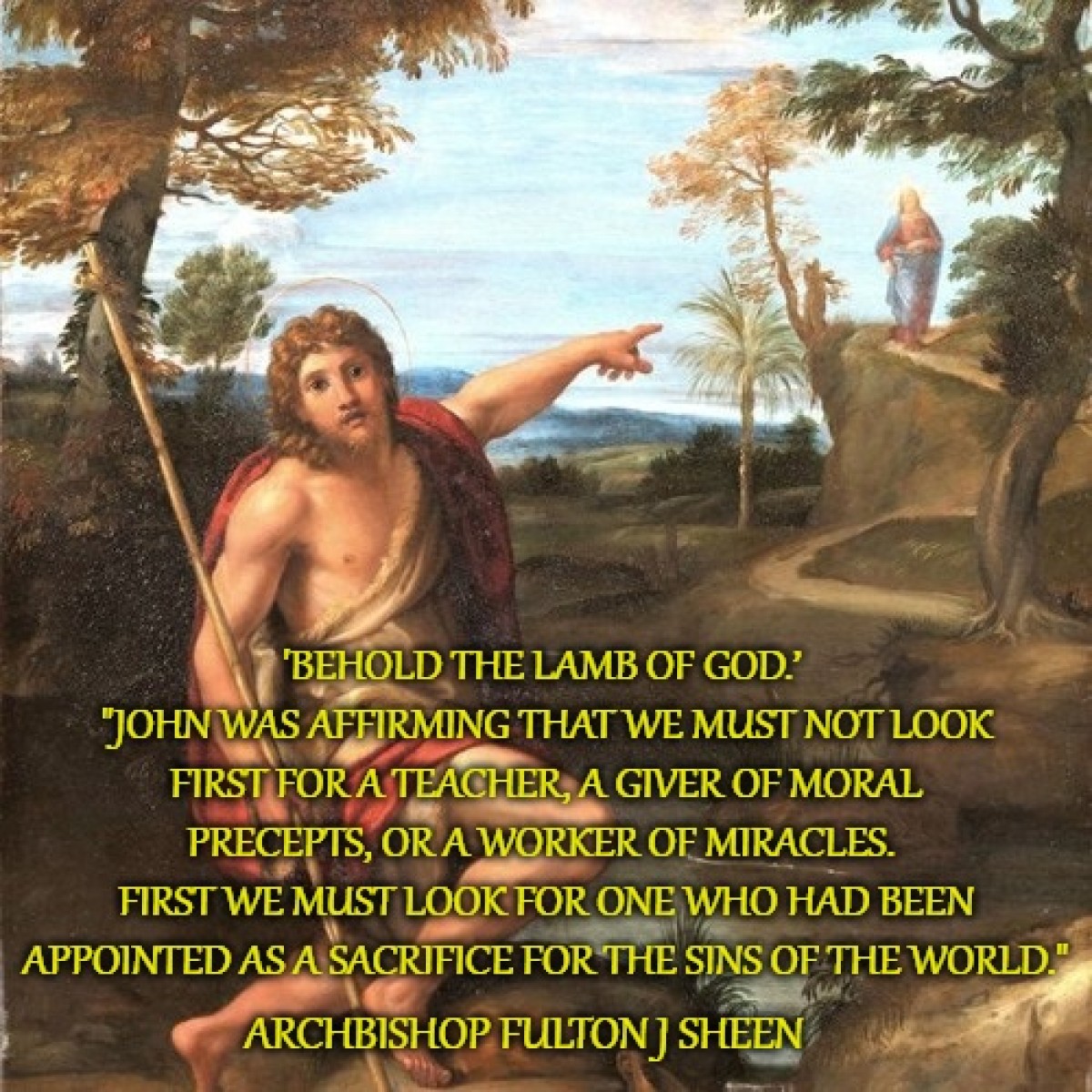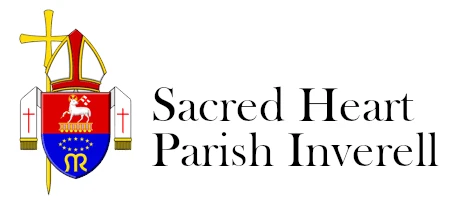2nd Sunday in Ordinary Time (Year B) - 14 January
14th January 2024

“Recognise in this bread what hung on the cross, and in this chalice what flowed from His side … whatever was in many and varied ways announced beforehand in the sacrifices of the Old Testament pertains to this one sacrifice which is revealed in the New Testament.” - St Augustine of Hippo
A reflection on today's Gospel by the Venerable Archbishop Fulton J Sheen:
"‘Behold the Lamb of God.’ John was affirming that we must not look first for a teacher, a giver of moral precepts, or a worker of miracles. First we must look for One Who had been appointed as a sacrifice for the sins of the world. The Passover was approaching, and the highways were filled with people driving or carrying their one-year-old lambs to the temple to be sacrificed. In full view of those lambs, John pointed out the Lamb Who, when sacrificed, would end all sacrifices in the temple, because He would take away the sins of the world.
"John was the parting voice of the Old Testament, in which the lamb played such an important role. In Genesis, we find Abel offering a lamb, the firstling of his flock, in a bloody sacrifice for the expiation of sin. Later on, God asked Abraham to sacrifice his son Isaac—a prophetic symbol of the Heavenly Father sacrificing His own Son. When Isaac asked, 'Where is the lamb?' Abraham said: ‘My son, God will see to it that there is a lamb to be sacrificed.’ The answer to the question, 'Where is the lamb of sacrifice?' asked in the beginning of Genesis, was now answered by John the Baptist as he pointed to Christ and said, 'Here is the Lamb of God.' God had at last provided a Lamb.
"The lamb was most often used as a victim of sacrifice, because of its innocence and mildness; therefore, it was an emblem most suited to the character of the Messiah. The fact that John the Baptist called Him the Lamb of God is most significant; He was neither the peoples’ lamb, nor the lamb of the Jews, nor the lamb of any human owner, but the Lamb of God. When the Lamb was finally sacrificed, it was not because He was a victim of those who were stronger than Himself, but rather because He was fulfilling His willing duty of love for sinners. It was not man who offered this sacrifice, although it was man who slew the victim; it was God Who gave Himself.
"Peter, who was a disciple of John and who probably was there that day, would later on make clearer the meaning of 'the Lamb' when he wrote: ‘What was the ransom that freed you … You know well enough that it was not paid in earthly currency, silver or gold; It was paid in the Precious Blood of Christ; No Lamb was ever so pure, so spotless a Victim.’ (I Peter 1:18)
"‘Thou art Simon the son of Jona; Thou shalt be called Cephas, (Which means the same as Peter).’ The word Cephas meant 'rock' we do not get the full flavour of it in English, because Peter, the proper name, is not the same as our word ‘rock.’ The words were identical in the Aramaic which Our Blessed Lord spoke, just as they are in French, where the proper name Pierre is the same as pierre, or rock. In Scripture, whenever God changed the name of a man, it was to raise him to a higher dignity and role in the community to which he belonged. Our Lord might have been saying to Peter, ‘you are impulsive and fickle and unreliable, but one day all this will be changed; you will be called by a name that no one would dare give you now—Rock Man.’" (Life of Christ)
O Lamb of God Prayer (St Irenaeus of Lyons)
O Lamb of God, who takes away the sin of the world, look upon us and have mercy upon us; You who art Yourself both victim and Priest, Yourself both Reward and Redeemer, keep safe from all evil those whom You have redeemed, O Saviour of the world. Amen. 


Food for thought
The ear of the soul is more important than the tongue in prayer, for faith comes from listening. When you spend time with God do you find yourself doing all the talking? Do you give a monologue of petitions or a litany of complaints then depart without waiting to hear an answer? Is your call to God, ‘Listen, Lord, Your servant is speaking,’ instead of, ‘Speak, Lord, Your servant is listening’? We learn to speak through listening, and we grow to love God through listening. If we do nothing but talk we will never hear what the Lord is seeking to tell us. So do not be afraid of silence. It is in the silence that the voice of God can be heard.
Lamb of God
The Agnus Dei is sung during the fraction, the breaking of the consecrated Host. St John Chrysostom preached of how the fraction symbolised the Passion of Christ: “What Christ did not suffer on the Cross, He suffers in the sacrifice for thee.” The hymn itself invokes Christ and recalls His sacrificial death with overtones of a hymn of victory of the triumphal Lamb. This belief is then emphasised again when the priest holds up the fractured Host and says, “Behold the Lamb of God, behold Him who takes away the sins of the world, blessed are those called to the supper of the Lamb.”
As we celebrate the mysteries of the Mass, we look to the Lamb who suffered, died, and rose for our salvation. We must gather around the altar of the Lamb, offering to Him our own hearts and pledging to be His servants, so that we may welcome Him and become wedded to Him in the Holy Eucharist.


